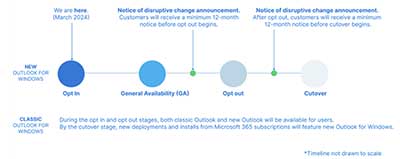News
Microsoft Plans Gradual Switch to New Outlook for Windows
Microsoft this week explained a bit more about its rollout plans for switching organizations over to the "new" Outlook for Windows e-mail and calendar app.
The new Outlook for Windows, which shares the same codebase as Outlook on the Web, was described as being currently "available for preview" by commercial customers. It is "getting closer to readiness for General Availability," the announcement added.
Organizations having access to the new Outlook for Windows preview will see a toggle switch option in the top right corner of the old client. It lets users switch between the two product versions.
New Outlook for Windows Rollout Plans
Microsoft showed the following timeline outlining its rollout plans in the announcement:
 [Click on image for larger view.]
Figure 1. Microsoft's rollout plans for the new Outlook for Windows application (source: March 7, 2024 Microsoft Tech Community post).
[Click on image for larger view.]
Figure 1. Microsoft's rollout plans for the new Outlook for Windows application (source: March 7, 2024 Microsoft Tech Community post).
Microsoft's timeline omits dates, but the team had previously noted in September that it would take about two years to complete the new Outlook for Windows rollout. In a confusing announcement, Microsoft also claimed back in September that the new Outlook for Windows 11 had reached the general availability stage for personal account users. It was also said to be released as an "enterprise ready" release for organizations at that time, which meant that it was a preview with the word preview removed.
The new Outlook for Windows is currently missing many of the features that are present in the so-called "classic" version of the product. Several Reddit.com threads have popped up with commenters ruing the absence of these features, such as this one. However, Microsoft eventually intends to switch organizations subscribing to Microsoft 365 services over to the new Outlook for Windows at some point, without the ability to roll back, which Microsoft described as its "cutover" stage.
New Outlook for Windows Stages
Currently, the new Outlook for Windows is at the so-called "opt-in" stage, which is turned off by default. If users toggle back to the classic Outlook client, Microsoft will prompt them for feedback.
The next release stage for the new Outlook for Windows will be "general availability," although feature development will still be "ongoing" during the general availability stage. At this stage, "customers with relevant licensing will be able to obtain regular and assisted technical support through their respective Microsoft support programs."
After general availability, the new Outlook for Windows will reach a so-called "opt-out" stage, where the "new Outlook is 'on by default,' bringing users into the new Outlook experience automatically." During the opt-out stage, it'll still be possible for users to switch back to the classic client. Microsoft is planning to give its customers 12 months' advance notice before moving to this stage.
The last stage, cutover, will be a complete switchover where "the ability to switch back to classic Outlook will no longer be available to users." Microsoft again plans to give a 12 months' advance notice before implementing this stage.
Microsoft 365 subscribers will get switched in this way to the new Outlook for Windows client. However, the classic Outlook will continue to be supported for Outlook for Windows perpetual licensees. Perpetual licensees have classic Outlook support "until at least 2029."
About the Author
Kurt Mackie is senior news producer for 1105 Media's Converge360 group.